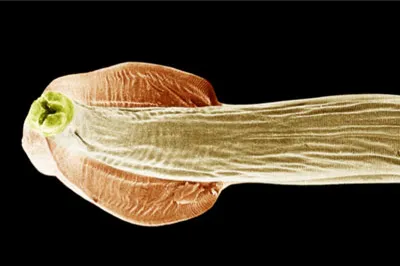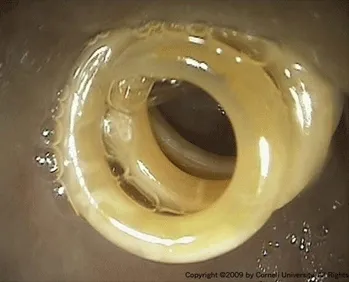Roundworms are one of the most widespread internal parasites affecting dogs, with nearly all puppies encountering them at some point. These resilient worms can be transmitted in various ways, making them a persistent challenge for pet owners. While commonly associated with canine health issues, a critical concern is the potential for these parasites to spread to people. Understanding How Can Humans Get Roundworms From Dogs is essential for safeguarding both your pet’s well-being and your family’s health.


Dogs can contract roundworms through several avenues. Puppies often acquire them directly from their mother, either prenatally (in the womb) or postnatally through nursing on infected milk. Additionally, dogs can become infected by ingesting microscopic larvated eggs present in contaminated soil or by consuming small mammals, like mice, that harbor roundworm larvae in their tissues.
Recognizing Roundworm Infection in Your Canine Companion
Adult roundworms reside in a dog’s intestines. While many infected dogs, particularly adults, may not show obvious symptoms, severe infestations, especially in puppies, can manifest as diarrhea, vomiting, noticeable weight loss, a dull coat, and a characteristic pot-bellied appearance. If the migrating larvae reach the lungs, a cough may also develop. Occasionally, pet owners might observe the actual adult worms, which are white or light brown and several inches long, in their dog’s feces or vomit.
The Direct Link: How Can Humans Get Roundworms From Dogs?
Roundworms pose a significant, yet often underestimated, health risk to humans, especially children. The primary way how humans can get roundworms from dogs is through accidental ingestion of embryonated roundworm eggs. These eggs are shed in infected dog feces and can survive in the environment, particularly in soil, for extended periods. When humans come into contact with contaminated soil or dog feces – for instance, while gardening, playing outdoors, or through indirect contact – and then touch their mouth, they can unknowingly ingest these eggs. This condition in humans is medically known as toxocariasis.
Once ingested, the roundworm larvae hatch and migrate through various organs in the human body, causing a condition known as Visceral Larva Migrans (VLM) or Ocular Larva Migrans (OLM) if they reach the eyes. Symptoms can range from general malaise to more severe issues affecting the eyes, lungs, heart, and even neurological systems. This zoonotic transmission highlights the crucial need for diligent hygiene and pet parasite control. For concerns about other pet parasites, you might wonder if can dog mites be transferred to humans – another important aspect of pet health awareness.
Comprehensive Prevention Strategies for Pets and People
Preventing roundworm transmission involves a two-pronged approach focusing on both pet care and human hygiene.
For Your Dog:
- Regular Deworming: Puppies should receive deworming treatments at 2, 4, 6, and 8 weeks of age, followed by monthly preventive treatments. Nursing mothers should also be on a monthly preventive and treated concurrently with their puppies to minimize transmission risk.
- Fecal Examinations: Annual fecal (stool) examinations are vital for adult dogs, with 2 to 4 checks recommended during a puppy’s first year.
- Environmental Control: Regularly clean your dog’s living areas and promptly remove feces to prevent egg accumulation. Discourage your dog from eating wild animals, which can be carriers.
- Veterinary Consultation: Many heartworm preventives also offer protection against roundworms. Consult your veterinarian for the most suitable prevention and treatment plan for your dog. If you are exploring various treatments for pet parasites, you might also be interested in natural remedies for mange mites in dogs.


For Humans:
- Strict Hygiene: Always wash hands thoroughly with soap and water after handling pets, gardening, or any direct contact with soil.
- Supervise Children: Ensure children do not play in areas potentially contaminated with animal feces. Teach them the importance of handwashing after outdoor play.
- Proper Feces Disposal: Promptly and responsibly dispose of all dog feces, preferably by bagging and discarding it in waste bins.
- Gardening Safety: Wear gloves when gardening or handling soil.
By implementing these preventive measures, you can significantly reduce the risk of roundworm infection for both your dog and your family. Staying informed about various parasitic threats is key to responsible pet ownership.
Conclusion
Roundworms are a common parasite in dogs, but their potential to affect humans underscores the importance of stringent prevention and hygiene practices. Understanding how humans can get roundworms from dogs empowers pet owners to take proactive steps, from regular veterinary care and deworming for their pets to meticulous hand hygiene and environmental cleanliness for themselves and their families. Always consult your veterinarian for the best advice on parasite control tailored to your dog’s specific needs and local risks. Protecting your family and your furry friend by staying vigilant against parasites is a cornerstone of responsible pet care.
